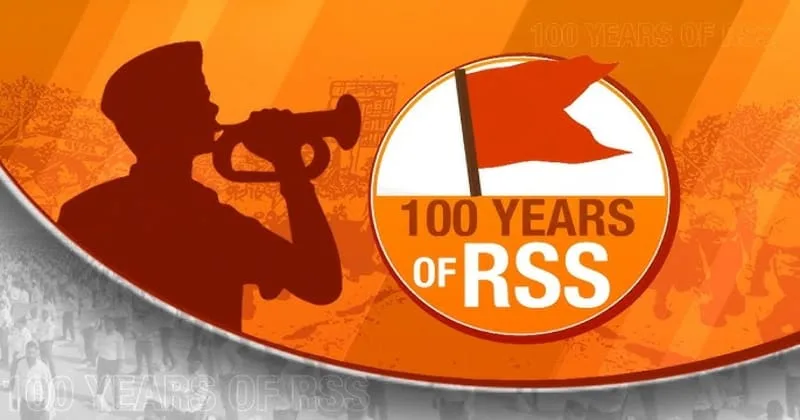World
India Today Debate Examines 100 Years of RSS Ideology and Impact

In a recent debate on India Today TV, Prafulla Ketkar and Tushar Gandhi engaged in a spirited discussion regarding the ideology of the Rashtriya Swayamsevak Sangh (RSS). This year marks the centenary of the RSS, prompting a critical examination of its influence on Indian society and politics. While Ketkar defended the RSS’s role and philosophy, Gandhi expressed concerns about what he described as divisive rhetoric stemming from the organisation.
The conversation highlighted the contrasting narratives surrounding the RSS and its historical context. Gandhi accused Ketkar of employing “poisonous language” when defending the RSS, suggesting that an intense ideological bias can lead to misinformed statements. Ketkar, on the other hand, argued that the RSS has significantly contributed to India’s development and unity, claiming that it has expanded beyond India to over 70 countries and established numerous organisations dedicated to various social causes.
One key point of contention was the historical comparison between the rise of communism and the RSS. While communism thrived globally by the 1960s, Ketkar noted that the RSS struggled to gain traction initially. He posited that the RSS’s growth reflects a broader endorsement of its ideals among the Indian population, contrasting this with the decline of communist influence, which he linked to a record of violence and oppression throughout the 20th century.
The debate also touched on significant historical events, such as the Partition of India, which resulted in widespread violence and displacement. Ketkar pointed out that the Congress party, historically associated with Gandhi’s vision, was complicit in the partition—a point he believes undermines the party’s current criticisms of the RSS. The discussion also revisited Article 370, which granted special status to Jammu and Kashmir, with Ketkar arguing that the RSS’s efforts to abolish this article were aimed at fostering national integration.
Gandhi countered by highlighting the perceived alignment between the RSS and certain political agendas, calling into question the inclusivity of its ideology. He asserted that the RSS fosters division through its rhetoric, particularly regarding religious and cultural identities. This accusation aligns with a broader critique of how political parties, including Congress, have historically navigated relations between different religious communities in India.
The debate further explored the role of the RSS during crises, including the 1984 anti-Sikh riots. Ketkar cited instances where RSS volunteers stepped in to provide aid when governmental structures failed, framing this as evidence of the organisation’s commitment to humanitarian efforts. Notably, he referenced the contributions of the RSS during the 1962 Sino-Indian War, where volunteers assisted both the military and local communities.
As the discussion unfolded, it became evident that both participants held firm convictions about their respective positions. Ketkar asserted that the RSS embodies a philosophy of “Bharatiyatva,” or Indian-ness, which encourages individuals to prioritise national interests above all else. He claimed that the current government, led by Prime Minister Narendra Modi, has made significant strides in uplifting marginalized communities, aligning with the RSS’s vision.
In contrast, Gandhi urged for a more critical examination of the RSS’s impact on India’s diverse social fabric. He warned against the potential for ideological conformity that might arise from an uncritical endorsement of the RSS’s narrative.
As the debate concluded, it underscored the complexities of India’s socio-political landscape, particularly regarding the legacy of the RSS and its role in shaping contemporary discourse. The centenary of the RSS serves as a pivotal moment for reflection and discussion on these pressing issues, inviting citizens to consider the implications of the past on India’s future trajectory.
-

 World5 months ago
World5 months agoSBI Announces QIP Floor Price at ₹811.05 Per Share
-

 Lifestyle5 months ago
Lifestyle5 months agoCept Unveils ₹3.1 Crore Urban Mobility Plan for Sustainable Growth
-

 Science4 months ago
Science4 months agoNew Blood Group Discovered in South Indian Woman at Rotary Centre
-

 World5 months ago
World5 months agoTorrential Rains Cause Flash Flooding in New York and New Jersey
-

 Top Stories5 months ago
Top Stories5 months agoKonkani Cultural Organisation to Host Pearl Jubilee in Abu Dhabi
-

 Sports4 months ago
Sports4 months agoBroad Advocates for Bowling Change Ahead of Final Test Against India
-

 Science5 months ago
Science5 months agoNothing Headphone 1 Review: A Bold Contender in Audio Design
-

 Top Stories5 months ago
Top Stories5 months agoAir India Crash Investigation Highlights Boeing Fuel Switch Concerns
-

 Business5 months ago
Business5 months agoIndian Stock Market Rebounds: Sensex and Nifty Rise After Four-Day Decline
-

 Sports4 months ago
Sports4 months agoCristian Totti Retires at 19: Pressure of Fame Takes Toll
-

 Politics5 months ago
Politics5 months agoAbandoned Doberman Finds New Home After Journey to Prague
-

 Top Stories5 months ago
Top Stories5 months agoPatna Bank Manager Abhishek Varun Found Dead in Well









